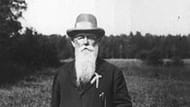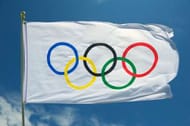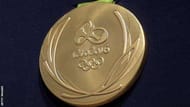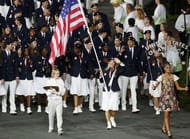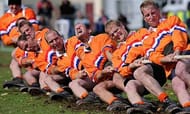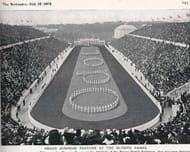The wait is almost over as the marvelous city of Rio Di Janeiro is all set to host the 31st edition of the Olympics. If the participation in various competitions meets the expected numbers, Rio 2016 will become the biggest sporting spectacle in the history of mankind. A total of 10,500 athletes are expected to participate in Rio 2016, representing 207 different countries.
Rio di Janeiro is the first South American city to host the Olympics, having beat the cities of Madrid, Tokyo and Chicago in the final stage of voting. The city is in the spotlight again, two years after hosting the FIFA World Cup in 2014.
Ever since its inception in 1896, the modern Olympic games have witnessed all kinds of drama and emotions, and some of the facts about the Olympic games are simply astonishing. Here is a list of 10 stupefying and staggering Olympic facts!
#1 The 54-year long marathon run
Yes, you read it correctly, the number mentioned is indeed 54! Japanese athlete Shiso Kanakuri took 54 years, 8 months, 6 days, 5 hours, 32 minutes and 20.3 seconds to finish the marathon run he started in the 1912 Stockholm Games. He was one of the two athletes who represented Japan at the 1912 Stockholm Games and his selection was made after an impressive performance of finishing a 25 mile run in 2 hours, 30 minutes and 32 seconds.
The tiredness of the 20-day long journey from Japan to Stockholm and the extremely hot conditions on the day of the Games got the better of him as he lost consciousness midway through the race. A Swedish farming family saw Kanakuri in that state and tended to him. Kanakuri was devastated by his failure to finish the race and left for Japan the very next day without notifying the Swedish Olympic committee.
He was invited by the Swedish National Olympic Committee to finish the race on the 55th anniversary of the Stockholm games. At the age of 75, he finished the marathon by running a lap around the Stockholm Olympic stadium. “It was a long trip. Along the way, I got married, had six children and 10 grandchildren,” he said.
Kanakuri died at the age of 92 and is considered as the “father of marathon” by the Japanese.
#2 Age is just a number
If there are any Olympic records that will never be broken, they would be the following two – the records of the youngest and oldest Olympic medal winners.
Dimitrios Loundras holds the record for the being the youngest ever Olympic medallist. He represented Greece in Athens 1896 and won a bronze medal in the parallel bars team event at the age of 10 years and 218 days. Loundras was a member of the Ethnikos Gymnastikos Syllogos team which finished third among the three teams which participated in the event.
Oscar Swahn represented Sweden in three Olympic games in the years 1908, 1912 and 1920. He won a silver medal in the shooting event known as ‘running deer’, at the 1920 Antwerp Games. He was 72 years and 281 days old at that point of time. The Swede also holds the record of being the oldest gold medalist in the history of the games after he won the gold medal in the same competition at the 1912 games. He has won 3 golds, 1 silver and 2 bronze medals.
#3 The colours of the Olympic flag symbolise the whole world
The Olympic flag was designed by Baron Pierre de Coubertin in the year 1912. It consists of five interlaced rings of different colours on a white background. The colours of the rings are blue, yellow, black, green and red.
“The six colours combined in this way reproduce the colours of every country – without exception. The blue and yellow of Sweden, the blue and white of Greece, the tricolours of France, England, America, Germany, Belgium, Italy, and Hungary, and the yellow and red of Spain, are placed together with the innovations of Brazil or Australia, with old Japan, and with new China. Here is truly an international symbol,” Coubertin stated in 1912. He is also the founder of the International Olympic committee.
The Olympic flag was first displayed in Paris in 1914 when the International Olympic Committee were celebrating its 20th anniversary, and it was flown for the first time at Antwerp 1920.
#4 It’s not really gold!
It is obvious that the only thing better than winning a silver medal at the Olympic games is actually winning the gold itself. But both these medals are made of the same thing!
The Olympic gold and silver medals are 92.5% silver in composition. The fact that both the first and second place winners practically take home the same thing is a bit surprising, to say the least.
The gold medal gets the colour because it is plated with 6 grams of gold. The last time winners were presented with solid gold medals was in the 1912 Games.
All of the medals are supposed to be at least 3mm thick and 60mm in diameter, and the bronze medals are mainly composed of copper and tin.
Another surprising fact is that the winners in the 1896 games were not awarded a medal, which had gold at least in its name. They received a silver medal and an olive branch. Second place winners were awarded a bronze medal and third place winners were not given anything!
#5 The Fabulous Five
To participate in the Olympic games is a big honour in itself and winning a medal at the Olympics, the grandest occasion of them all is every athlete’s dream. But what if an athlete wins medals in both the summer and winter Olympics? That could well be called the pinnacle of glory, and only five Olympians have achieved that feat.
Eddie Eagan was the first athlete to win medals at both the Summer and Winter Olympics and he holds the elusive record of winning gold medals in both versions of the Olympic games. Eagan won the bronze medal for boxing in Antwerp 1920 and gold for Bobsleigh (four men) in Lake Placid 1932. Jacob Tullin Thams of Norway won the gold for Ski Jumping in Chamonix 1924 and silver for sailing in Berlin 1936.
Christa Luding-Rothenburger won medals for speed skating in three different Winter Olympic Games and won a silver medal for cycling in Seoul 1988. Canadian athlete Clara Hughes has won a couple of bronze medals for cycling in Atlanta 1996 and has won medals for speed skating at three different winter Olympic games.
Fifth and last in the last is Lauryn Williams of the USA. She won a silver medal at Sochi 2014 and a gold and another silver in London 2012 and Athens 2004 respectively.
#6 The American Supremacy
The United States of America leads the medal tally by some margin. They have won a staggering number of 2399 medals int the Summer Olympics and another 282 in the Winter Olympics. The Americans have taken home a total of 976 golds, 757 silvers and 666 bronze medals from the 26 games they have participated in.
Second in the list are USSR who have participated in only 10 Games and have less than half the number of medals that the USA have won, but average more medals per edition. However, the USA are not the country that top the all-time medal tally of the Winter Olympics. Norway leads that table with a total of 329 medals comprising of 118 gold, 111 silver and 100 bronze medals.
Along with Austria and Liechtenstein, Norway is one of the three countries who have won more medals at the Winter Olympics than the Summer Games.
#7 Paes and Phelps – two Olympic superhumans!
Leander Paes, who is one of the best doubles players of all time, is set to participate in the Olympics for a record seventh time. The Indian, who has participated in every Olympic games from Barcelona 1992, will become the first tennis player to participate in seven Olympics.
Paes won a bronze medal in Atlanta 1996 and has a career like no other. He has won an eye-popping 18 Grand Slams in men’s doubles and mixed doubles categories. The 43-year-old will be partnered by Rohan Bopanna at Rio 2016. Bopanna will also partner Sania Mirza in the mixed doubles category.
The name Micheal Phelps is one of the very first names that pops out of the Olympic record books. It will be a crime not to mention his name in an article such as this one. Phelps has won a record number of 22 medals and certainly there is more to come from the most decorated Olympian ever.
#8 China’s wait till 1984
The most populated country in the world had to wait till Los Angeles 1984 to win a medal at the Olympics. China participated in Olympics from 1932 to 1948 as a part of Republic of China. It was in the 1952 Summer Games that the Chinese participated in the games in the name of the People’s Republic of China for the first time. They withdrew from the Summer Games till 1984 due to various reasons.
China won their first Olympic gold medal through Xu Haifeng, who won the 50m pistol event. Since then China has been climbing the all-time medal table. The 2008 Beijing Olympics saw the Chinese finish first in the medal standings ahead of the USA, and Beijing will host the 2022 Winter Olympics.
China is expected to provide tough competition for the USA in Rio 2016 in the battle for first place in the medal tally.
#9 Pigeon shooting and tug-of-war
Killing animals on purpose occurred only once in the Olympics, in Paris 1900. About 300 birds were killed in this bizarre shooting event. There were two competitions, with a different set of rules obviously, but in both the events, the shooter who killed the most number of birds won the gold medal. Leon de Lunden of Belgium and Donald MacIntoshof Australia won the two events by killing 21 and 22 birds respectively.
If it was out of necessity that pigeon killing events were banned from the Olympics, but tug-of-war was removed because it wasn’t prestigious enough by International Olympic Committee standards. Tug-of-war was a part of the Games from 1900 to 1920 and one would feel its exclusion is a bit harsh. However, instances like the same country winning all three medals – like the USA did in 1904 – could occur.
If tug-of-war someday returns to the Games, the rules of the event should change from the ones which existed the last time it was a part of the Olympics nearly a century ago.
#10 A six-month-long Olympics
Rome was supposed to be the city to host the 1908 Games, but Italy could not afford to host at that point of time because of the financial catastrophe caused by the eruption of Mt. Vesuvius. So the Olympics were re-located to London and the 1908 London Games is the longest edition in the history of the Olympics.
The Summer Games went on for 187 days (6 months and 4 days). The opening ceremony was on 27th April and the closing ceremony on 31st October.
The games had a lot of controversies, with Finland, Russia and Sweden being in the thick of them. Athletes representing 22 nations participated in the Games and a total of 110 sporting events were contested. Obviously, home advantage is of great significance as Great Britain finished first in the medal standings with 146 medals followed by the USA and Sweden.
